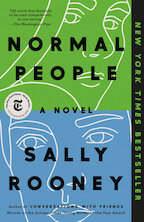What are you reading in May?

In our monthly book club, we discuss whatever we happen to be reading and ask everyone in the comments to do the same. What Are You Reading This Month?
How To Be Depressed by George Scialabba
The joke is that I want to go from proficient to expert. Or that I’m such a sad case that I need help being depressed. Closer to the truth is that I have an interest in the topic, especially when it’s viewed by someone with a literary sensibility. In How To Be Depressed, critic George Scialabba presents his lifelong history of chronic depression, with the bulk of the book composed of his psychiatrists’ and other health care workers’ case notes, spanning 50 years of treatment. These reports—often written in such a way as to preempt liability—summarize his therapy sessions, in- and out-patient treatment, and medication regimens. Despite, or because of, the dry prose, there is humor to be found here: “His life is ‘bearable but dull,’ which sounds to me like an improvement,” reads one note. It all comes together as a character study of sorts, especially when considering the stories people tell about themselves, which often obscure deeper truths. (I think of the Kenneth Koch poem “One Train May Hide Another.”) The chapter “Tips For The Depressed,” published this March on n+1, comes closer to satisfying the implied promise of the book’s title. While none of his suggestions are revelatory, Scialabba understands that often what a depressed person most needs is to be told what to do, even, or especially, the simplest, most mundane tasks: get out of bed, eat a good breakfast, go for a walk. He knows that none of it is a cure; each thing is merely a way to get a person to the next moment of their life, to lighten their burden even a little. This line, for example, made me laugh: “Also mentioned compulsive book-buying, despite the fact that ‘I’ve only read 10% of my books.’” Some problems are incurable. [Laura Adamczyk]
DisneyWar by James B. Stewart
The thing about devouring the 2005 showbiz exposé DisneyWar in the past few weeks is that I couldn’t stop running into its major players whenever I closed the book and opened my phone or computer. There was Bob Iger, the loyal Capital Cities/ABC soldier who ascends to the top job at the Walt Disney Company in the final pages (despite taking an absolute drubbing from some of the book’s other sources), walking back his retirement announcement in order to see the never-more-dominant entertainment conglomerate through the challenges posed by COVID-19. There was Jeffrey Katzenberg, the executive who helped mastermind the so-called Disney Renaissance with animated films like The Little Mermaid and Beauty And The Beast (and whose explosive exit from the studio gives author James B. Stewart the perfect ending to the first of DisneyWar’s three parts), spinning, spinning, spinning while his newest baby, Quibi, failed to meet the expectations set by the $1.8 billion invested in it. About the only living DisneyWar principal without a noticeable footprint in today’s popular culture is the guy whose rise and fall Stewart exhaustively charts across 500-plus pages: former CEO, chairman, and out-of-his-depth Wonderful World Of Disney host Michael Eisner. The events chronicled in the book are all at least a decade and a half in the past now, but they still reverberate in 2020—when Disney gobbles up whole rival studios rather than just fourth-place TV networks, when the internet still tempts yet befuddles suits who came up through the legacy media ranks, and when the person whose name has become synonymous with the Walt Disney Company (who isn’t a Disney themselves) once again struggles with ceding the Magic Kingdom’s throne. Stewart’s gift is to make boardroom politics and obligations to shareholders as compelling as Disney’s making-of triumphs and its c-suite’s outrageous misfires; what’s happening with the company now begs for a DisneyWar sequel, but Stewart divulged so much in the first book, I doubt he’s allowed anywhere near Iger and his staff at this point. [Erik Adams]
“The Pressure To Perform Is Wearing Us Down” by Britni Danielle
Medium’s ZORA publication is made by and for women of color, but it should be bookmarked by everyone. I’ve found a lot of comfort and insight in the site’s “Burnout Effect” series, which explores the cumulative effect (and potential dangers) of our responsibilities and desires, now that we have “all the time in the world” to fulfill them. I read Britni Danielle’s piece, “The Pressure To Perform Is Wearing Us Down,” before bed last night, and for the first time in ages, turned on my phone’s “do not disturb.” [Danette Chavez]
Normal People by Sally Rooney
I binge-watched all of Normal People on Hulu over the course of two late, weepy nights, and was completely absorbed by the intimate relationship between Marianne and Connell, two Irish students who weave in and out of each other’s lives over the course of several years. The granular, nakedly impassioned breakdown of just how much one person can mean to another had me riveted, and when it was over, I was a little bereft. So I read the novel the series is based on and, remarkably, underwent a similar experience. I was pleased to see that Normal People the show picked up much of the dialogue in Sally Rooney’s book word for word. I was even more impressed with how the series was able to translate the many internal monologues in Rooney’s novel into potent emotional performances. I wound up with even greater regard for both the series and the book, a combination I highly recommend if you’ve got the emotional stamina for a few soggy, late nights. [Gwen Ihnat]